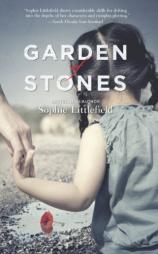Garden of Stones
Review
Garden of Stones
GARDEN OF STONES addresses the more than 100,000 Japanese-Americans who lived in concentration camps across the United States during the Second World War. Families were imprisoned en masse by the government for unfounded suspicions of cavorting with enemy armies, or allegedly engaging in spy activities to assist the Axis Powers. In the last half-decade, Manzanar (the concentration camp at the center of this novel) became the most well-known facility of its kind and was designated a National Historic Site.
The creation of these internment camps was an unfortunate, illogical and meaningless act, a purely negative response to Pearl Harbor and the direct result of an order perhaps not fully considered by Franklin D. Roosevelt. It was later questioned by Congress along with two American Presidents, eventually leading to official apologies issued for public actions that can only be acknowledged today as exceptionally regrettable and based on overt racial prejudice. For the families imprisoned, a formal apology must have meant little. The loss of dignity and culture was incalculable, and the tangible losses of lives and financial ruin were not ameliorated. In a war that focused largely on issues of morality, Americans seemed to be guilty of similar attitudes at home.
"GARDEN OF STONES is a remarkable work of fiction based on solid facts and a plausible scenario about a family that is quite engaging and unique. The book and writing are immediately engrossing and engage the reader’s sympathies deeply."
This novel spans more than a 30-year period from just before the attack on Pearl Harbor to the ’70s, beginning in L.A. and funneling through a family’s private grief, fear and agony as a mother and daughter yearn to escape daily anguish and bondage --- all for a country that has returned none of their deepest commitments and loyalties. This is an exceptionally patriotic family who, like most others, were productive citizens.
Alternating chapters jump back in time between the experiences of this family during the War and long after its end, showing much about other Japanese-Americans along the way and then hovering over San Francisco three decades later. A former inmate, Lucy Takeda, faces potential charges for murder after having been seen near the site of a dead man who was a notorious guard at the Manzanar Prison.
In the ’70s, Lucy’s daughter, Patty, is happy and hopeful, in the prime of her life and soon to be married, but completely unaware of her mother’s past. Patty’s private fears of seeing a loved one serving time for a crime she probably did not commit drive her to frantically and hurriedly look for evidence that might clear her mother from suspicion, but her thorough ignorance of her mother’s past forces Patty to face the realization that her mother might have committed the murder. Typical of Americans, Patty is naïve to what happened to the thousands in these prison camps kept hidden from the world, protected by the silence of even those who lived through it. Even with the loss of lives, many carried their scars silently, and years later, Lucy’s wounds are born heroically and stoically, although they run deep and are both physical and psychological.
Patty’s fierce determination to discover the truth directs her toward old photographs and letters, and coaxing difficult memories from her mother about living behind barbed wire fences manned by armed guards, surviving abhorrent conditions, being forced to work and hoping to simply survive, and staying busy in the midst of social isolation and daily harassment. Lucy and her mother lived in constant fear of the guards and others who seemed eager and waiting to take advantage of the downtrodden and helpless. It was an officially sanctioned state of madness.
GARDEN OF STONES is a remarkable work of fiction based on solid facts and a plausible scenario about a family that is quite engaging and unique. The book and writing are immediately engrossing and engage the reader’s sympathies deeply. Reading this dramatic, affecting account is an illuminating and insightful journey. There is also a very gratifying element of poetic justice at the end for the war prisoners, at least for this one family. Sophie Littlefield’s novel is well worth reading and will enlighten many about the mob mentalities and culture of the age.
Reviewed by Melanie Smith on March 1, 2013
Garden of Stones
- Publication Date: February 26, 2013
- Genres: Fiction
- Paperback: 320 pages
- Publisher: Harlequin MIRA
- ISBN-10: 0778313522
- ISBN-13: 9780778313526





